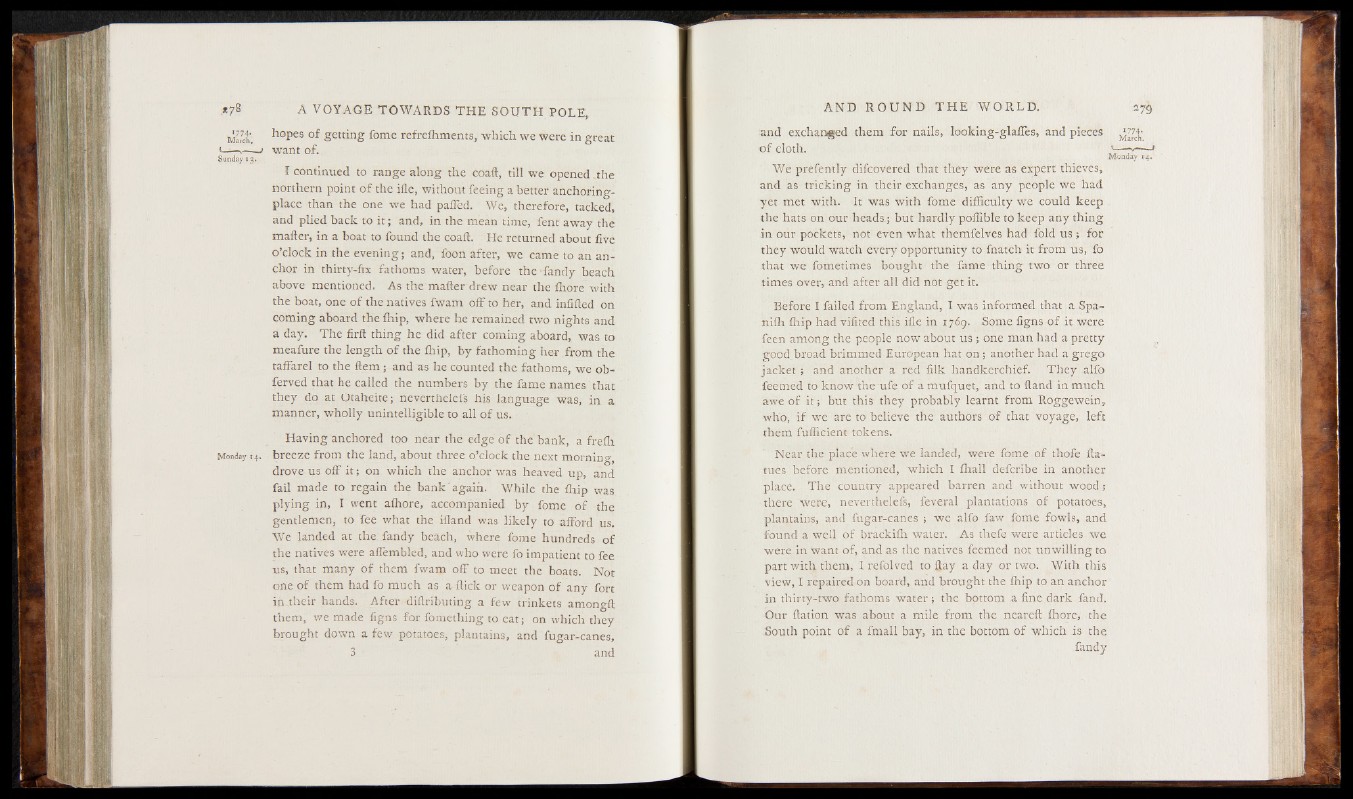
Marcfc hoPes of ge«ing fome refrefhments, which we were in great
»——.----| want of.
Sunday 13.
I continued to range along the coaft, till we opened .the
northern point of the ifle, without feeing a better anchoring-
place than the one we had palled. We, therefore, tacked,
and plied back to it; and, in the mean time, fent away the
mailer, in a boat to found the coaft. He returned about five
o’clock in the evening; and, foon after, we came to an anchor
in thirty-fix fathoms water, before the Tandy beach
above mentioned. As the mailer drew near the ffiore with
the boat, one of the natives fwam off to her, and infilled on
coming aboard the Ihip, where he remained two nights and
a day. The firft thing he did after coming aboard, was to
meafure the length of the Ihip, by fathoming her from the
taffarel to the ftem ; and as he counted the fathoms, we ob-
ferved that he called the numbers by the fame names that
they do at Otaheite; neverthelefs his language was, in a
manner, wholly unintelligible to all of us.
Having anchored too near the edge of the bank, a frefh
Monday 14. breeze from the land, about three o’clock the next morning,
drove us off it; on which the anchor was heaved up, and
fail made to regain the bank again. While the fliip was
plying in, I went afhore, accompanied by fome of the
gentlemen, to fee what the illand was likely to afford us.
We landed at the fandy beach, where fome hundreds of
the natives were affembled, and who were fo impatient to fee
us, that many of them fwam off to meet the boats. Not
one of them had fo much as a flick or weapon of any fort
in.their hands. After diftributing a few trinkets amongft
them, we made figns for fomething to. eat; on which they
brought down a few potatoes, plantains, and fugar-canes,
3 and
and exchanged them for nails, looking-glaffes, and pieces ‘w-
of cloth. I—
Monday r$.
We prefently difcovered that they were as expert thieves,
and as tricking in their exchanges, as any people we had
yet met with. It was with fome difficulty we could keep
the hats on our heads ; but hardly poffible to keep any thing
in our pockets, not even what themfelves had fold us ; for
they would watch every opportunity to fnatch it from us, fo
that we fometimes bought the fame thing two or three
times over, and after all did not get it.
Before I failed from England, I was informed that a Spa-
nifh fliip had vifited this ifle in 1769. Some figns of it were
feen among the people now about us ; one man had a pretty
good,broad brimmed European hat on; another had a grego
jacket ; and another a red filk handkerchief. They alfo
feemed to know the ufe of a mufquet, and to {land in much
awe of i t ; but this they probably learnt from Roggewein,
who, if we are to believe the authors of that voyage, left
them fufficient tokens.
Near the place where we landed, were fome of thole fta-
tues before mentioned, which I fhall defcribe in another
place. The country appeared barren and without wood;
there were, neverthelefs, feveral plantations of potatoes,
plantains, and fugar-canes ; we alfo faw fome fowls, and
found a well of brackifh water. As thefe were articles we
were in want of, and as the natives feemed not unwilling to
part with them, I refolved to flay a day or two. With this
view, I repaired on board, and brought the fhip to an anchor
in thirty-two fathoms water; the bottom a fine dark fand.
Our ftation was about a mile from the neareft fhore, the
South point of a fmall bay, in the bottom of which is the
fandy